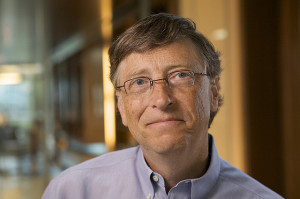Is Philanthrocapitalism the Answer to Climate Change?

On December 11, 2016, Microsoft co-founder Bill Gates announced the launch of Breakthrough Energy Ventures (BEV), a billion-dollar investment fund, which will invest in research, and technologies “that have the potential to reduce greenhouse gas emissions by at least half a gigaton”. The fund is co-owned by some of the world’s richest entrepreneurs and venture capitalists, from Amazon founder and CEO Jeff Bezos to Alibaba’s Executive Chairman Jack Ma. It will serve as the venture arm of the Breakthrough Energy Coalition, a group of 28 high net worth investors from ten countries committed to funding clean energy companies emerging from the initiatives of Mission Innovation, which was also announced at the 2015 United Nations Climate Change Conference.
In Gates’ opinion, funding should be targeted at researchers investigating the early stages of problems affecting the climate. According to the Coalition’s website, while the government can fund basic research, BEV will back those that are embarking on risky ventures by “providing seed, angel and Series A investments, with the expectation that once these investments have matured, traditional commercial capital will invest in the later stages.” The fund is looking to invest broadly across five key sectors- electricity generation and storage, transportation, industrial use, agriculture, and energy system efficiency.
With the current US administration’s position on climate research and innovation hostile, can “impact investing” be the necessary solution? While President Trump has not spoken extensively about his views on energy research to reduce greenhouse gas emissions, he has appointed people who reject climate science to important positions, such as the head of the Environmental Protection Agency. According to Alden Meyer, a climate campaigner with the Union of Concerned Scientists, “President Trump and his team are pursuing what I call a ‘control-alt-delete’ strategy: control the scientists in the federal agencies, alter science-based policies to fit their narrow ideological agenda, and delete scientific information from government websites”. Thus, as the government chooses to ignore scientifically established claims about climate change, private initiatives such as BEV are attempting to fill the void. However, can Gates and his team of millionaires successfully come to the rescue?

Philanthrocapitalism or venture philanthropy takes concepts and techniques from venture capital finance and business management and applies them to achieving philanthropic goals. Increasingly, the world’s wealthiest see themselves as social investors, arguably a trend started by Gates himself. In 2010, Gates along with Berkshire Hathaway founder, and billionaire Warren Buffet started the “Giving Pledge”, a campaign to encourage the world’s richest to donate at least half of their wealth to charity in their lifetime or at the time of their death.
While proponents of philanthrocapitalism argue that this is perhaps one of the most efficient ways for the 1% to give back to society, critics say that is comes with a cost to the taxpayer and the democratic process in general. They contend that private charity places too much power in the hands of the elite and delegitimizes the state. Especially in the US, which tax-subsidizes charity, billionaires choosing to set up their own philanthropic institutions can circumvent capital gains and estate taxes. In a system already rife with inequality, should the unelected economic elite have the power, and discretion to bypass the democratically elected government? According to economist Thomas Piketty, instead of encouraging private philanthropy, governments must work to introduce robust wealth and inheritance taxes to lower inequality.
While this argument shapes the debate around private philanthropic foundations, BEV steers clear of such critique because it is a for-profit Venture Capital (VC) fund. The bigger problem with the combination of VC and cleantech, however has been the resounding failure of this model in the past. From 2006 to 2011, VC investors plowed $25 billion into the cleantech sector and lost over half of it. As a result, funding dropped from over $5 billion in 2008 to $2 billion in 2013. According to researchers at the MIT Energy Initiative, “cleantech companies developing new materials, hardware, chemicals, or processes were poorly suited for VC investment because they required significant capital, had long development timelines, were uncompetitive in commodity markets, and were unable to attract corporate acquirers”. The researchers encourage governments and corporations to share the risks involved in cleantech since they do not work within the time or capital constraints of VCs. In their view, the partnership between the Breakthrough Energy Coalition and Mission Innovation provides an interesting model to boost environmental innovation. The Coalition’s investments will “complement a concurrent effort by twenty countries around the world who have signed on to the Mission Innovation pledge to double public R&D funding to $30 billion by 2020”.
While the previous experience of VCs in the cleantech field has been unsuccessful,?John Arnold, an energy hedge fund manager and board member in BEV, has said that being a 20-year fund with patient capital allows the fund to have a longer-term outlook and fund technologies that do not fit into the traditional VC model. Gates has added, “It’s such a big market that the value if you’re really providing a big portion of the world’s energy, the value of that will be super, super big”. BEV estimates the global energy market at $6 trillion, with energy demand rising by one-third by 2040.
While Gates and his colleagues are optimistic about the future, it is the broader backing by the public sector that has the potential to bring these investments to fruition. However, with President Trump having threatened to withdraw from the 2015 Paris Climate Agreement during his campaign, it is unclear whether public-private partnerships around this issue will build. Unfortunately, for now, all Gates and we can do, is wait.
